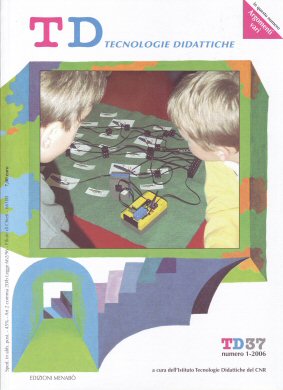Autoregolazione dell'apprendimento e tecnologie didattiche
Contenuto principale dell'articolo
Abstract
Dettagli dell'articolo
Fascicolo
Sezione
Gli autori che pubblicano su questa rivista accettano le seguenti condizioni:
- Gli autori mantengono i diritti sulla loro opera e cedono alla rivista il diritto di prima pubblicazione dell'opera, contemporaneamente licenziata sotto una Licenza Creative Commons CC BY 4.0 Attribution 4.0 International License.
- Gli autori possono aderire ad altri accordi di licenza non esclusiva per la distribuzione della versione dell'opera pubblicata (es. depositarla in un archivio istituzionale o pubblicarla in una monografia), a patto di indicare che la prima pubblicazione è avvenuta su questa rivista.
- Gli autori possono diffondere la loro opera online (es. in repository istituzionali o nel loro sito web) prima e durante il processo di submission, poiché può portare a scambi produttivi e aumentare le citazioni dell'opera pubblicata (Vedi The effect of Open Access).
Riferimenti bibliografici
Azevedo R., Hadwin A. F. (2005), Scaffolding self-regulated learning and metacognition. Implications for the design of computerbased scaffolds, Instructional Science, n. 33, pp. 367-379.
Boekaerts M. (1997), Self-regulated learning: a new concept embraced by researchers, policy makers, educators, teachers and students, Learning and Instruction, 7 n. 2 , pp.161-186.
Boekaerts M. (1999), Self-regulated learning: where we are today, International Journal of Educational Research, n. 31, pp. 445-457.
Dettori G., Giannetti T. (2006), Narrative creation and self-regulated learning. Analysing the support given by a technology-mediated authoring tool, in G. Dettori, T. Giannetti, A. Paiva and A. Vaz (eds.), Technology-mediated Narrative Environments for Learning, Rotterdam, NL, Sense Publishers, pp.133-142.
Hacker D. J. (1998), Definitions and Empirical Foundations, in D. J. Hacker, J. Dunlosky, A. C. Graesser (Eds.), Metacognition in educational Theory and Practice, Mahwah, NJ, Lawrence Erlbaum Associates, pp.1-23
Kramarski B., Zeichner O. (2001), Using technology to enhance mathematical reasoning: effects of feedback and self regulation learning, Educational Media International, n. 38 (2-3), pp. 77-82.
Paris S. G., Winograd P. (2001), The role of self-regulated learning in contextual teaching: Principles and practices for teacher preparation, http://www.ciera.org/ library /archive/2001-04/0104 parwin.htm (05/04/06).
Rosario P., Nuñez Perez J.C., González-Pienda J.A. (2004), Stories that show how to study and how to learn: an experience in the Portuguese school system, Electronic Journal of Research in Educational Psychology, 2 n.1, 131-144, http://www.investigacionpsicopedagogica. org/revista/ articulos/3/english/ Art_3_32. pdf (05/04/06).
Sanz de Acedo Lizarraga M. L., Ugarte M. D., Cardelle-Elawar M., Iriarte M. D., Sanz de Acedo Baquedano M. T. (2003), Enhancement of self-regulation, assertiveness and empathy, Learning and Instruction, n.13, pp. 423- 439.
Schraw G. (1998), Promoting general metacognitive awareness, Instructional science, n. 26, pp.113-125.
Schunk D.H., Zimmerman B.J. (1998), Self-regulated learning, from teaching to self-reflective practice, New York, The Guilford Press.
Van Den Boom G., Paas F., Van Merrienboer J. J.G., Van Gog T. (2004), Reflection prompts and tutor feedback in a web-based learning environments: effects on students’ self-regulated learning competence, Computer in Human Behaviour, n. 20, pp. 551-567.
Vye N. J., Schwartz D. L., Brasford J. D., Barron B. J., Zech L. (1998), SMART Environments that support monitoring, reflection, and revision, in D. J. Hacker, J. Dunlosky, A.C. Graesser (Eds.), Metacognition in educational Theory and Practice, Laurence Erlbaum Associates, Mahwah, NJ, pp. 305-346.
Weinert F.E. (1982), Selbstgesteuertes Lernen als Voraussetzung, Methode und Ziel des Unterrichts, [Self-regulated learning as prerequisite, method and objective of instruction], Unterrichtswissenschaft, vol.10 n. 2, pp. 99-110.
Winnie P. H. (2005), A perspective on state-of-the-art research on self-regulated learning, Instructional Science, n. 33, pp. 559-565.
Zimmerman B.J. (1998), Developing self-fulfilling cycles of academic regulation: an analysis of exemplary instructional models, in D.H. Schunk, B.J. Zimmerman (eds.) Self-regulated learning, from teaching to self-reflective practice, New York, The Guilford Press, pp.1-19.
Zimmerman B.J. (2000), Attaining self-regulation: a social cognitive perspective, in M. Boekaerts, P. Pintrich, M. Zeidner (eds.), Handbook of self-regulation, New York, Academic Press, pp.13-39.
Zimmerman B.J. (2001), Theories of self-regulated learning and academic achievement: an overview and analysis, in B. J. Zimmerman & D.H. Schunk (eds.), Self-regulated learning and academic achievement, Mahwah, NJ, Lawrence Erlbaum Associates, pp.1-37.

